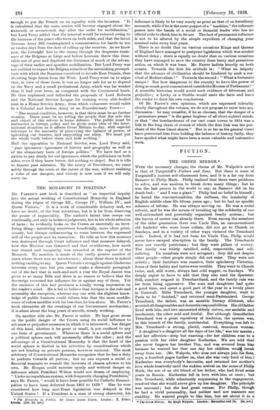THE MONARCHY IN POLITICS.•
Ma. FARBER'S new book is described as " an impartial inquiry into the actual working of Constitutional Monarchy in England during the reigns of George III., George IV., William IV., and Queen Victoria." It is a work of considerable industry and, we have no doubt, of the best intentions, but it is far from deserving the praise of impartiality. The author's latent bias creeps out continually, not only in isolated judgments, but in his whole selection of facts ; he evidently looks on the Crown as essentially an 'inter- fering thing—interfering sometimes beneficially, more often perni- ciously, but always endeavouring to come between the expressed will of the people and its execution. He tells us how this measure was destroyed through Court influence and that measure delayed, how this Minister was thwarted and that overthrown, how merit was denied and incapacity was rewarded at the caprice of the Monarch. No mention is made of the vastly greater number of cases where there was no interference ; about these there is indeed nothing exciting to say. Queen Victoria's struggle against Gladstone interests every one, but you cannot make a dramatic paragraph out of the fact that in such-and-such a year the Royal Assent was given to so many Bills and there is no reason to believe that the Sovereign exercised her influence for or against any of them. Yet the omission of this fact produces a totally wrong impression on the reader's mind. He is led to believe that intrigue is the rule and neutrality the exception, whereas any one with the slightest know- ledge of public business could inform him that the most meddle- some of rulers meddles with far less than he lets alone. Mr. Farrer's book chronicles all the creakings of our Government mechanism ; it is silent about the long years of smooth, steady working.
On another side also Mr. Ferrer is unfair. He lays great stress on the public danger of the Crown using its social influence to advance or prejudice measures in which it is interested ; but danger of this kind, whether it be great or small, is not confined to any one form of government. Wherever there is a social sphere and a political sphere each will necessarily affect the other ; and the advantage of a Constitutional Monarchy is that the head of the social sphere is limited in his activities by considerations which are not binding on private persons, however eminent. The most arbitrary of Constitutional Monarchs recognizes that he has a duty to perform towards all parties ; but no one expects a social or financial magnate to consult the intereete of classes adverse to his own. Mr. Morgan could exercise openly and without danger an influence which President Wilson would not dream of employing. " Under no republican system, with frequently changing Presidents," says Mr. Farrar, " would it have been possible for Catholic Emanci- pation to have been deferred from 1801 to 1829." Has he ever considered how long anti-Trust legislation was delayed in the United States ? If a President is a man of strong character, his
• The Monarchy in Politica. By James Anson Farrer. London : T. Fisher iinwin. figs. ad. .not.)
influence is likely to be very nearly.as great as that of an hereditary monarch, while if he is the mere puppet of a " machine," the influence passes into the hands of a social or financial leader who has no official code to check him in its use. The feet of permanent influence is not to be altered by the simple expedient of changing your nominal ruler every four years.
There is no doubt that on various occasions Kings and Queens of England have managed to postpone legislation which was needed without delay.; there is equally no doubt that on various occasions they have managed to save the country from hasty and pernicious action on which it was bent. Mr. Farrar indicts heavily on both counts. Towards the first his attitude is : " What an iniquity that the advance of civilization should be hindered by such a sur- vival of Mediaevalism 1" Towards the second : " What a fortunate escape ! But how dangerous to the country to have the power of doing so much good concentrated outsidetheHousea of Parliament! " A scientific historian would avoid such evidence of bitterness and prejudice ; a Lecky or a Stubbs would state the facts and leave the reader to draw his own conclusions.
Of Mr. Farrer's own opinions, which are expressed tolerably clearly throughout the volume, we do not propose to enter into any discussion : he may consider, if he so chooses, that the danger of a " premature peace " is the great bugbear of all short-sighted minds, or that " the bombardment of our east coast towns in 1914 was a link in the long chain of events of which the first link was the pur- chase of the Suez Canal aharea." But in so far as his general views have prevented him from holding the balance of history fairly, they have spoiled what might have been a most valuable and instructive work.


























 Previous page
Previous page